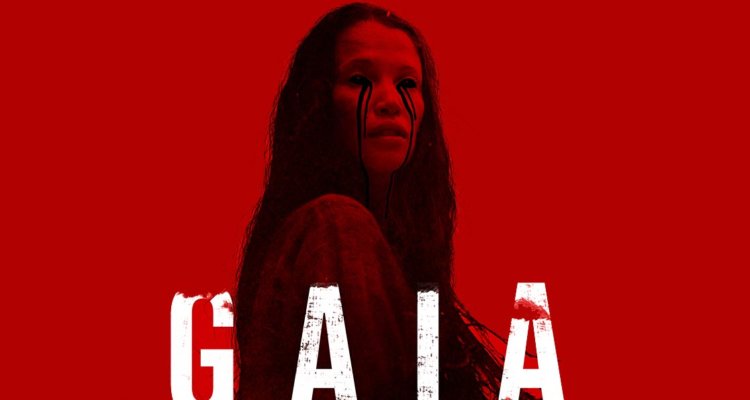If by chance Ben Wheatley’s “In the Earth,” a contagion eco-horror film that’s trippy to the point of incomprehensibility, left you dissatisfied and slighted, consider revisiting the niche with Jaco Bouwer’s “Gaia.” Bouwer indulges in uncertainty, too, but unlike Wheatley, he never confuses obscurity with profundity or meaning, which is a fancypants way of saying that “Gaia” allows itself to have fun and make a statement without talking over its audience’s head. The film runs on vibes but operates like a monster movie via the presence of gross fungal beasts borrowed from the same playbook as “The Last of Us,” capped with a rampant paranoia about who, in fact, the true monsters are.
READ MORE: ‘In the Earth’: A Pandemic Puzzler from Ben Wheatley [Sundance Review]
Maybe the mushroom creatures? Sure. They’re violent screeching critters that hunt by sound, live by night, and sport more chanterelles than the produce section at Whole Foods; that’s unimpeachably monstrous. But, historically speaking, man tends to be the greatest monster of all in these sorts of movies. So, in “Gaia” specifically, there’s not much of an argument worth making in the opposite direction. What Bouwer leaves up to viewers to decide is whether “man” refers to Barend (Carel Nel) and Stefan (Alex van Dyk), a father-son duo living a survivalist’s life deep in the Tsitsikamma Forest, nestled along South Africa’s coast; or literally everyone on the planet, the human race writ large, that infinitely-limbed behemoth devouring Earth bit by bit, thoughtlessly consuming its way toward an inevitable ecological cataclysm.
READ MORE: Summer 2021 Preview: Over 50 Movies To Watch
By the time “Gaia” ends, or perhaps beforehand depending on how seriously you take your environmental commentary, you’ll likely be convinced that each of these parties is very bad, but that the monsters, which die to arrows or a savage bludgeoning, aren’t the worst among them. Not that you’d want to end up in the same situation as park ranger Winston (Anthony Oseyemi), separated from your partner, completely lost, and yes, on the business end of a marauding and unidentified thing stalking you at dusk; this is no one’s idea of a good time. But so it goes for poor Winston and his partner, Gabi (Monique Rockman), similarly turned around but rescued by Barend and Stefan from the dangers of the forest. At least she gets to see the creatures for what they are.
READ MORE: The 100 Most Anticipated Films Of 2021
A shame that she doesn’t quite see Berand for who he is before suspicion and doubt sets in: a zealot who worships nature. Bouwer doesn’t appear to view Berand’s near-fanatical devotion to nature as a sign of malice, exactly. Instead, Berand ultimately emerges as the movie’s antagonist for entirely different reasons. This is where “Gaia” struggles most; Bouwer’s screenwriter, Tertius Kapp, gives Gabi, Berand, and Stefan clear, distinct outlines with space for each actor to sketch in the details where needed but the narrative never fully establishes their motivations. Consequently, “Gaia” reads like it’s missing 10 minutes of running time where Gabi’s determination to stay with Berand and Stefan might’ve been clarified, and Stefan’s quiet, childlike infatuation with Gabi might feel purposeful rather than a matter of fact.
READ MORE: The 25 Best Films Of 2020
So it goes. “Gaia” makes up for those deficits with excellent creature design and effects, plus directing decisions rooted in similar hallucinatory ground as “In the Earth”; the difference is that Bouwer wants to draw a sharp delineating line separating the film’s headier moments from reality while Wheatley doesn’t give a shit. Consequently, “Gaia” is more palatable despite its shortcomings. Cinematographer Jorrie van der Walt shoots the hell out of this film, capturing in detail every wrinkled stretch of tree bark, every patch of dirt dusted over Berand’s rail-thin form, every gill and scale of every mushroom cap: His work is stunning purely in terms of craftsmanship and grotesque in terms of intention because while van der Walt’s skill is impressive, neither he nor Bouwer means to make the movie look “pretty,” even in its most dreamy moments. Only people who have never seen how ugly nature can be would call “Gaia” beautiful. Call it aesthetically accomplished instead.
Van der Walt and Bouwer find the beating heart of darkness in Tsitsikamma, the focal point of the conflict between humanity and the environment, longstanding but coming to a head as Gabi plays witness to the end. But “Gaia”s clear anti-consumerist messaging avoids getting preachy. Bouwer equally favors the pulse-quickening thrill of hideous aberrations sieging Berand and Stefan’s cabin in the dead of night and the hypnagogic quality of surrealist symbolism. (Behold Berand making sweet whoopee to a hole in the ground. Watch as blood streams from Gabi’s eyes.) “Gaia” is a weird damn movie, but Bouwer’s filmmaking centers the weirdness so well that once it subsides, we remain assured that we’re on firm ground. There’s no “what if.” There’s just “what.” [B]
“Gaia” arrives in select theaters on June 18 before hitting VOD on June 25.

